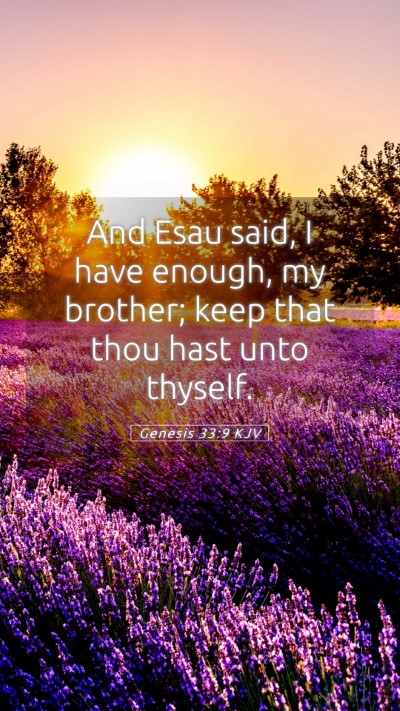Understanding Genesis 33:9
Verse: Genesis 33:9 - "But Esau said, 'I have enough, my brother; keep what you have for yourself.'"
Overview
This verse recounts the moment when Jacob, upon reuniting with his brother Esau, offers gifts as a gesture of goodwill. Esau’s reply reflects not only his contentment but also the deep personal dynamics and growth that have occurred since their tumultuous past.
Insights from Commentaries
To gain a deeper understanding of this Scripture, we explore insights from notable public domain commentaries:
-
Matthew Henry:
Henry emphasizes Esau's gracious acceptance of Jacob’s gifts as indicative of a reconciled relationship. He notes that Esau’s response showcases an important principle in relationships: the power of forgiveness and the rejection of bitterness. Esau’s willingness to forgo gifts signifies his personal wealth and contentment, highlighting God's provision in their lives.
-
Albert Barnes:
Barnes points out that Esau’s dismissal of Jacob’s offerings illustrates a man who has moved beyond past grievances. Esau represents a character who values relationships over material possessions. His readiness to embrace Jacob, despite their past conflicts, serves as a profound example of reconciliation and brotherly love.
-
Adam Clarke:
Clarke discusses the cultural significance of gift-giving in their time and interprets Esau’s response as a reflection of his wealth and position. He contextualizes this event within the larger narrative of Jacob's journey, emphasizing that Esau's response is not only a personal statement but a demonstration of God's grace manifesting in their relationship. Clarke suggests that the act of rejecting gifts can symbolize a greater understanding that grace cannot be earned but is freely given.
Thematic Analysis
This verse provides rich Bible study insights into themes of reconciliation, forgiveness, and the transformation of relationships over time. The exchange between Jacob and Esau serves as an illustration of the Biblical principle that true wealth lies in harmonious relationships rather than material possessions.
Application of the Teaching
In practical terms, the lesson from Genesis 33:9 encourages individuals to prioritize relationships and forgive past grievances. For those seeking to apply this Bible verse to daily life, it serves as a model of humility and grace.
Cross References
- Genesis 32:3-5 - Jacob’s preparation to meet Esau.
- Genesis 27:41 - Esau’s anger towards Jacob for stealing the blessing.
- Matthew 5:23-24 - The importance of reconciliation with others before worship.
- Luke 15:20 - The parable of the Prodigal Son and themes of forgiveness.
- Romans 12:18 - Living peaceably with all men.
Conclusion
Genesis 33:9 encapsulates significant Bible verse meanings related to familial relationships and divine providence. By acknowledging the changes in ourselves and others, and by choosing forgiveness over resentment, we reflect the essence of God's love. As readers study this verse, they can gain valuable insights into how to cultivate harmony in their own lives.


